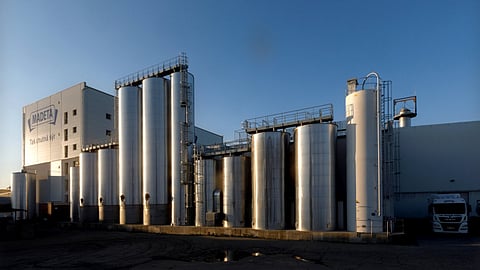
- Home
- EventsEvents
- Product Launches
- CategoriesCategories
- Advertise
- Opinion

GEA has installed a new cheese-making plant for Madeta in the Czech Republic. The new plant, which has a staff of 150, can process up to 400,000 liters of milk a day – twice the capacity of the former facility. GEA convinced the customer with a holistic approach developed individually for Madeta, from the appropriate process technology and the complex automation solution to the international team of experts.
The new plant in Planá is one of four production sites operated in the Czech Republic's South Bohemian Region by Madeta, the country's biggest dairy group. Each day, the plant produces up to 42 tons of hard and semi-hard cheese, including Maasdam, Emmental, Edam, Gouda, and Tilsit. According to GEA, the new facilities use cutting-edge technology, enabling the company to maximize production, maintain high-quality standards, and respond more quickly to the market's changing needs. Although the old production plant had reliably served Madeta for many years, the upgraded technology and production methods provided an opportunity to improve efficiency, yields, and technological safety and increase production.
Madeta already had a good relationship with GEA in the Czech Republic, but practical considerations drove the choice of technology partner for this project. Not only did GEA offer Madeta the right solution for its needs, but it was also able to integrate the third-party automation system, provide recipe control over the whole cheese line, and supply the interface to the company's ERP system – and do all of this as the sole supplier.
Scope of supply
The new installation includes milk storage tanks with connections to upstream and downstream pasteurizers; five new 15m3 integrated cheese vats; fresh water and dosing systems; whey extraction and storage, and heating of the cheese vats via the double jacket. GEA also supplied a new hygienic starter preparation system and the CIP system for the entire cheese area. The whey processing line was supplied exclusively by GEA in the Czech Republic, with technical support from GEA Engineering Office in Büchen, Germany. The process includes double pasteurization, involving one new line – including whey clarification and cream separation – and one existing line, which was upgraded. The existing separators were reused. GEA's Refrigeration Technologies division supplied a 500kW NH₃ heat pump and optimized the existing refrigeration system for the new cheese plant.
Automation
Automation is provided through GEA Codex software, which includes both the GEA master and dynamic recipe systems, providing full control of the cheese-making process. The GEA master recipe consists of every element of the process line, including specifications regarding the addition of rennet, starter, wash water, color, and calcium chloride. GEA's dynamic system, which is used at the Planá plant, makes it possible to flex the master recipe to factor in variations in the protein/fat ratio of the raw milk. All data is recorded by the GEA system and can be analyzed using Office tools, resulting in a more accurate and consistent cheese-making process.
As part of this project, GEA also implemented its cheese milk calculator. Based on the quantities of cheese sold, this program uses the cheese recipe to back-calculate the amount of cheese milk required and the ideal fat to protein ratio. Depending on the protein content of the raw milk, the calculator determines the mixture needed from the raw milk silos to achieve the ideal cheese milk composition as closely as possible. It is easy to adjust the fat content of the cheese milk, but the protein content can only be modified at this plant by mixing raw milk with different protein ratios.
Cross-divisional cooperation
Throughout the project, GEA's Czech and German operations worked closely with each other and the customer to ensure a successful outcome. This was especially important since installation and commissioning took place in 2020 under the constraints of the COVID-19 pandemic. "Numerous in-depth discussions, a detailed planning phase, and our expertise from the many cheese production projects we have participated in convinced Madeta that they had chosen the right partner," says Vaclav Ruzek, vice president of the Czech Republic Cluster at GEA. Despite the restrictions due to the coronavirus pandemic, the plant was handed over to the customer at the end of November 2020 as scheduled.
"Together with GEA, we successfully and constructively resolved all of the challenges arising in the course of this large project. Thanks to our good cooperation, all major milestones were met despite the difficulties wrought by the pandemic," concludes Ing Petr Payer, technical director at Madeta.
The new Madeta plant in Planá is designed to process up to 400,000 liters of milk per day, but its capacity can be increased to up to 600,000 liters a day if required. It is a shining example of how technology, engineering excellence, and know-how can come together to build a facility that will serve the manufacturer and its customers today and for many years into the future.
